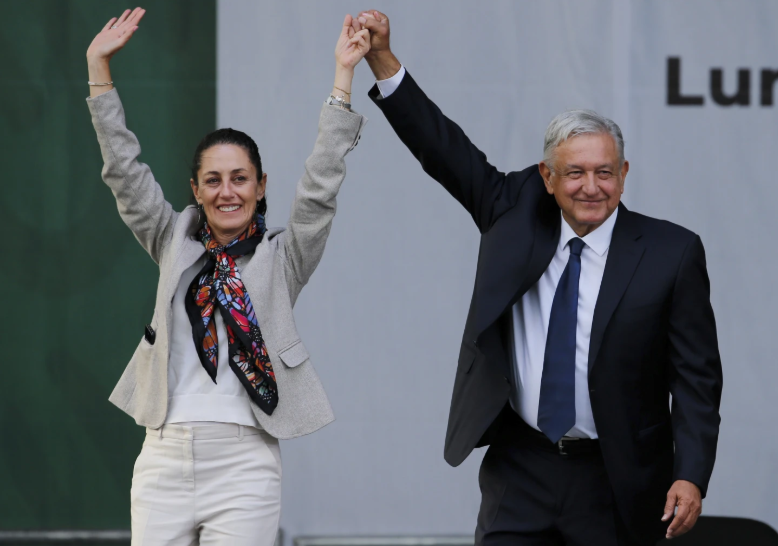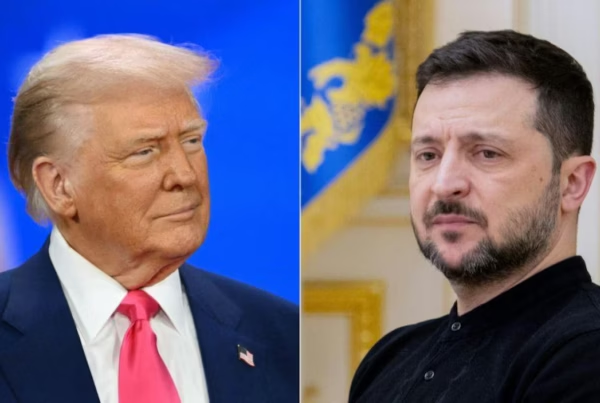This article originally featured in our autumn 2024 print edition.
Credit: Fernando Llano/AP Photo
On October 1, Claudia Sheinbaum became the first woman sworn in as president of Mexico. But what kind of government has she taken the helm of?
Andrés Manuel López Obrador (AMLO) has been President of Mexico since 2018. When he took office, he promised to transform the nation with an end to corruption, to violence, and to poverty.
The centre-left populist has been enormously popular, with approval ratings consistently above 60 percent during his term. Economist Viri Ríos, speaking to The Guardian, noted that “López Obrador doubled the minimum wage without creating macroeconomic instability.” From 2018 to 2022, according to Mexico’s National Council for the Evaluation of Social Development Policy, over 5 million people were lifted out of poverty—or 5.6 percent of the country’s population. Gallup polls found that 73 percent of Mexicans believed their standard of living was improving in 2023, up from 53 percent the year before the former president took office.
Despite his popularity, AMLO was unable to run for a second term under Mexican law. There were fears that he would seek re-election regardless, especially after his government proposed electoral reforms that would slash the funding of the National Electoral Institute.
López Obrador observed his country’s term limits, but he nonetheless leaves Mexico a changed state. In his last months in office, during the so-called “lame duck period,” the former president restructured an entire branch of the Mexican government. This transformation takes place against the backdrop of Mexico’s already complicated democratic history. Though the country emerged from more than eighty years of single-party rule in 2000, it is still battling corruption, human rights abuses, and organized crime, including high murder rates of electoral candidates.
Part of AMLO’s promise when he took power was to tackle these problems, but they have persisted. In this year’s federal elections, hundreds of candidates faced threats and more than twenty were killed. AMLO himself has faced allegations of corruption, including major reports earlier this year alleging that López Obrador’s 2006 campaign for the presidency received over 2 million USD in gifts from cocaine traffickers.
Contentiously, he passed an overhaul of the judicial system which will require all of the nation’s judges to stand for election. The changes, which the New York Times’ James Wagner called “the most far-reaching overhaul of a country’s court system ever carried out by a major democracy,” will also lower the required qualifications for judicial positions. Steeped in Mexico’s long history of corruption, the law is framed by AMLO and Morena as a shift in power from elites to the people—in line with his broader populist rhetoric. This interpretation is contested, however.
Many legal experts and democratic watchdogs fear that a system of elected judges is vulnerable to corruption and abuse. Mexico has long standing problems with corruption, and its people have little faith in its judiciary. Government surveys found that 2 in 3 Mexicans believe their judges are corrupt. This is a major problem for the stability of Mexican democracy, but it is unclear that an elected judiciary will be an effective solution. Opponents of such systems argue that elected judges are vulnerable to public pressure and voters usually have limited information about judges—especially in a system as big as the Mexican judiciary, where around 7,000 judicial positions are expected to be on the ballot. Proponents, however, see elections as a check on elite power and corruption. Indeed, this is the language AMLO used to argue for their enactment. Last month, he declared that the reform “reaffirms that in Mexico there is a true democracy, where the people elect their representatives … not the elites … not the oligarchy.”
Though many judicial systems elect a portion of their judges, Mexico’s plan is particularly far-reaching, installing elections even for their supreme court. That court, which overturned several laws passed by the former president’s administration, is set to have all of its justices replaced on June 1 of next year, fuelling fears of instability and partisanship.
Another component of this reform is the creation of a judicial disciplinary committee. This committee will have the power to investigate misconduct, but it will also be able to “investigate judges’ legal reasoning.” The director of the Centro de Investigación e Informática Jurídica (Center for Research and Legal Informatics) at Escuela Libre de Derecho, Arturo Ramos Sobarzo, said:
We are very concerned about this change because it does not establish clear rules. It provides a very easy and free process for initiating proceedings against federal judges and magistrates, and we believe this will impact judicial independence. A judge might be ruling against a government appointment, and [the disciplinary committee] could intervene.
Critics see this as another means for the manipulation of the judiciary, even as its proponents see it as an important check on judicial corruption, which is rife in the Mexican system.
Some will argue that even if AMLO has undermined democracy, his success in reducing poverty rates outweighs this danger. Regardless, his reforms bring to the fore major questions about the structure of government and how modern democracies must balance direct democracy and the separation of powers. As Thomas Graham, a journalist for The Guardian, put it: “Morena [the political party which AMLO founded] is moving Mexico away from the conception of liberal democracy defined by the separation of powers, and towards a vision of democracy that forefronts popular participation and majority approval.”
Though the man himself has left the National Palace, AMLO is expected to retain influence during Sheinbaum’s term. To this point, the new president has supported her predecessor’s reforms. We will see over the next six years how she tackles Mexico’s struggles with corruption, poverty, and violence amid renewed questions about the stability of her nation’s democracy.
Other posts that may interest you:
Discover more from The Sundial Press
Subscribe to get the latest posts sent to your email.





